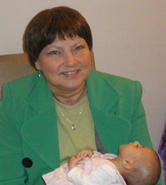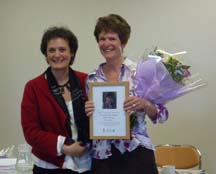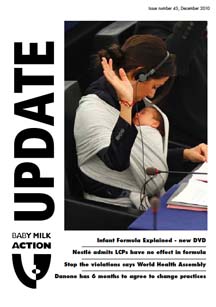Update 43
BFLG news
Nestlé: Get Set, Approval Gone!
 Sustain’s Children’s Food Campaign (CFC) found that Nestlé’s “Get set, go free” promotion breached a key message of the C4L campaign - to swap sugary foods and drinks for lower sugar or sugar-free products. A CFC survey found that 24 out of the 27 Nestlé products in the promotion are officially categorised as “high in sugar.” The Department of Health admitted that an error had been made when it approved Nestle’s use of the logo on the website - so the logo was removed.
Sustain’s Children’s Food Campaign (CFC) found that Nestlé’s “Get set, go free” promotion breached a key message of the C4L campaign - to swap sugary foods and drinks for lower sugar or sugar-free products. A CFC survey found that 24 out of the 27 Nestlé products in the promotion are officially categorised as “high in sugar.” The Department of Health admitted that an error had been made when it approved Nestle’s use of the logo on the website - so the logo was removed.
See: www.bbc.co.uk/news/health-11541433
Royal College of Midwives drops formula adverts
We congratulate the Royal College of Midwives for deciding in 2010 to remove all adverts for breastmilk substitutes from their journal. Meanwhile the Community Practitioners and Health Visitors Association (CPHVA), another Baby Feeding Law Group (BFLG) member, which has never carried follow-on milk adverts, is steadily reducing the number of infant formula adverts carried.
Members of the Royal College of Speech and Language Therapists were concerned to find Nestlé advertising in their journal and a defence of its baby food marketing practices on the letters page. The RCSLT’s new policy allows no advertising from companies that violate the International Code. RCSLT has also joined the Breastfeeding Manifesto Coalition, so will be campaigning alongside us for the strengthening of the UK formula regulations.
Pam Lacey Award for Breastfeeding Counsellors
 We are saddened to report the death on the 5th November of Pam Lacey, Chair of the Association of Breastfeeding Mothers (ABM). Pam (left) has been a generous and wonderful support to Baby Milk Action and we'll miss her terribly. Under her leadership ABM has gone from strength to strength and has been an outspoken ally in the struggle to protect and support breastfeeding everywhere. ABM plan to set up a new Award for Breastfeeding Counsellors in her honour.
We are saddened to report the death on the 5th November of Pam Lacey, Chair of the Association of Breastfeeding Mothers (ABM). Pam (left) has been a generous and wonderful support to Baby Milk Action and we'll miss her terribly. Under her leadership ABM has gone from strength to strength and has been an outspoken ally in the struggle to protect and support breastfeeding everywhere. ABM plan to set up a new Award for Breastfeeding Counsellors in her honour.
Julie Crawford Award for Health Visitors
 The 2009 Julie Crawford Award for Health Visitors, was presented to the inspirational Alison Spiro from North West London at Baby Milk Action’s AGM in April 2010 (right). The Award was set up by the Baby Feeding Law Group in honour of Julie, a former Director of Baby Milk Action who died in 2001. We are seeking nominations for the 2011 Award now. Candidates must be practising health visitors who have made a significant contribution to breastfeeding support in the UK, facilitating universal access for support that is independent of commercial influence.
The 2009 Julie Crawford Award for Health Visitors, was presented to the inspirational Alison Spiro from North West London at Baby Milk Action’s AGM in April 2010 (right). The Award was set up by the Baby Feeding Law Group in honour of Julie, a former Director of Baby Milk Action who died in 2001. We are seeking nominations for the 2011 Award now. Candidates must be practising health visitors who have made a significant contribution to breastfeeding support in the UK, facilitating universal access for support that is independent of commercial influence.
http://info.babymilkaction.org/pressrelease/pressrelease22apr10
BFLG says NO to corporate funding and influence
Since May, the UK has had a Conservative/Liberal Democrat Coalition Government. In its first few months of office it has proposed radical cuts to public spending and a pro-market approach in health reforms. In November, the Guardian revealed that the Health Secretary, Andrew Lansley, had invited the major food companies to help him write health policy on obesity. Asking them to identify priorities and barriers, such as EU legislation, that they would like removed. Lansley has assured companies that he wants to explore voluntary not regulatory approaches.
For those of us seeking to strengthen rather than weaken legislation on marketing this is a worrying time. However, we are holding on to the fact that the Coalition Programme for Government does promise to ‘crackdown on irresponsible marketing,’ to ‘promote public health,’ to ‘protect consumers’ and to ‘tackle health inequalities’. Also, the Liberal Democrats (like the Greens) have officially signed up to the Nestlé Boycott and to the demands of the Baby Feeding Law Group (BFLG) and the Breastfeeding Manifesto Coalition (BMC) - namely to fully implement the International Code and WHA Resolutions (see press release).
The obesity programme, Change4Life (C4L), set up by the previous Labour Government, had an off-spring called Start4Life (S4L) which covered infant feeding. In response to our lobby, and unlike C4L, S4L did not have corporate sponsors so its messages were not weakened.
In July Lansley asked Nestlé, Pepsi, Coca Cola and others to increase funding to C4L. In September, we heard that S4L might also have to have corporate sponsors. BFLG and BMC - representing over 40 health professional and lay organisations - including the Royal College of Paediatrics and Child Health and the Royal College of Midwives, wrote to the Department of Health and to Lansley, listing companies that we would find totally unacceptable: any infant feeding, food, tobacco or alcohol company and any company targeting families. We said that companies such as leisure, telecommunications or financial services should be considered only if they are first thoroughly checked for bad social practices and monitored on an ongoing basis.
We reminded the Government of its obligations under the International Code, the WHA Resolutions and the Global Strategy for Infant and Young Child Feeding to provide objective, evidence-based information on infant and young child feeding and most of all to avoid conflicts of interest. Baby Milk Action suggested raising funds from junk food, alcohol and tobacco taxes.
The response to us from Lansley’s office, and from Public Health Minister Anne Milton to Annette Brooke MP, says DH is fully committed to promoting and encouraging breastfeeding and UNICEF’s UK Baby Friendly Initiative accreditation in the NHS, which includes adhering to the International Code. DH also promised to consult BFLG members on any potential S4L sponsors.
STOP PRESS: Breastfeeding at work
As we go to press a new White Paper Healthy Lives, Healthy People: Our strategy for public health in England is published. This highlights the need to increase UK breastfeeding rates, which at 46.2% at 6-8 weeks, are among the lowest in Europe. The White Paper states that:
“The Department of Health will work in partnership with employers to encourage breastfeeding-friendly employment policies, through pilots involving an acute NHS trust, over 300 children’s centres in areas with low breastfeeding rates, a primary school and a secondary school.”
This is a welcome move, although nothing is said about the Review of the formula marketing regulations sitting in Lansley’s in tray. And of course what women really need is the protection of the ILO Maternity Protection Convention (C103) - the legal right to breastfeeding breaks which is under discussion in the European Parliament and common in European and more than 90 countries worldwide.
In the UK the majority of women give up breastfeeding long before they want to and before they return to work, because they failed to get the right advice and support (all affected by marketing). Of those still breastfeeding between six and nine months, over 20% cited return to work as the reason for stopping breastfeeding. Only 14% of employers offered facilities to express milk. Ref: UK Infant Feeding Survey (2005).
Also see: www.ibfan.org/fact-maternity.html
Thinking strategically
 Mike Brady, Campaigns and Networking Coordinator, writes: Baby Milk Action is part of the International Baby Food Action Network (IBFAN). With our partners we are monitoring baby food companies against the International Code of Marketing of Breastmilk Substitutes, adopted by the World Health Assembly, which came about partly as a result of the Nestlé Boycott (page 9).
Mike Brady, Campaigns and Networking Coordinator, writes: Baby Milk Action is part of the International Baby Food Action Network (IBFAN). With our partners we are monitoring baby food companies against the International Code of Marketing of Breastmilk Substitutes, adopted by the World Health Assembly, which came about partly as a result of the Nestlé Boycott (page 9).
In this Update we report on our advocacy with our IBFAN partners at the World Health Assembly for a new Resolution which helps keep pace with new marketing strategies and scientific knowledge (page 6). IBFAN works to bring the Code into legislation and defend measures which support parents and carers (page 8). We also work to improve the global standards on the composition and labelling of baby foods which helps protect all babies - those fed on formula as well as those breastfed. (page 12).
 Our Policy Director, Patti Rundall (right), received a second Caroline Walker Trust Award 2010 in November (the first in 1989). The citation reads: ‘Patti continues to be an absolute force in ensuring that infants’ and children’s nutritional health is protected by challenging health claims and promoting optimal infant feeding worldwide.’
Our Policy Director, Patti Rundall (right), received a second Caroline Walker Trust Award 2010 in November (the first in 1989). The citation reads: ‘Patti continues to be an absolute force in ensuring that infants’ and children’s nutritional health is protected by challenging health claims and promoting optimal infant feeding worldwide.’
Nestle is the market leader, more since so taking over Gerber, and sets trends others follow (page 14). Monitoring has revealed how much of a problem Danone has become since buying the Nutricia, Milupa and Cow & Gate brands and must clean up or we will call for a boycott to put pressure on its executives (page 13). Nestlé is now one of the four most boycotted companies on the planet (page 18). Our resources and campaigns help you to promote the boycott and increase the pressure (page 19 - 24). The boycott has forced some important changes in policies and practices and recently forced a crackdown on big displays of Nestlé formula in supermarkets in Africa. However, the company is still refusing to end other harmful practices (page 17).
We communicate directly with the baby food companies and, together with organisations campaigning on other aspects of Nestlé malpractice, have registered complaints with the UN Global Compact and Swiss Government. Their failure to act exposes fundamental problems with current systems for holding corporations to account and we are making the case for a stronger international regulatory framework (page 16). Interestingly, Nestle argued at its AGM that regulations are unnecessary, claiming it already has sound principles and core values (page 18).
We also work on our own doorstep in the European Union (page 11) and the UK, where the new Coalition Government is presenting new challenges (page 4). Once again it is people like you reporting cases of aggressive company marketing that provides the evidence we need to bring in the changes which will allow all parents to make fully informed decisions. Our new DVD, produced with the Baby Feeding Law Group, provides objective information and is a useful resource for health workers to use with parents who intend to use infant formula (page 10).
Who, what, why?
Baby Milk Action
Baby Milk Action is a non-profit organisation which aims to save infant lives and to end the avoidable suffering caused by inappropriate infant feeding. We work as part of the International Baby Food Action Network (IBFAN) to strengthen independent, transparent and effective controls on the marketing of the baby feeding industry. IBFAN has over 200 member organisations in more than 100 countries.
Baby Feeding Law Group
Baby Milk Action is the Secretariat for the Baby Feeding Law Group which is working to bring UK legislation into line with UN Resolutions. BFLG members include consumer and mother-support groups and professional bodies such as the Community Practitioners and Health Visitors’ Association, the Royal College of Midwives, the Royal College of Nursing, the Royal College of Paediatrics and Child Health, and UNICEF's Baby Friendly Initiative.
International Code
We work for controls implementing the International Code of Marketing of Breast-milk Substitutes (The International Code). This Code was adopted in 1981 by the World Health Assembly (WHA), the world’s highest policy setting body. The International Code bans all promotion of breastmilk substitutes and was adopted as a ‘minimum requirement’to be implemented by member states ‘in its entirety’.
The International Code and the subsequent relevant WHA Resolutions, which have clarified or extended certain provisions of the Code, must be considered together in the interpretation and translation into national measures.
Protecting breastfeeding
There is no food more locally produced or sustainable than breastmilk. A breastfed child is less likely to suffer from gastroenteritis, respiratory and ear infections, diabetes, allergies and other illnesses. In areas with unsafe water a bottle-fed child is up to 25 times more likely to die as a result of diarrhoea. Reversing the decline in breastfeeding could save 1.5 million lives around the world every year. Breastfeeding helps fulfill the UN Millennium Development Goals and has the potential to reduce under-5 mortality by 13%. A further 6% of deaths could be saved through appropriate complementary feeding. Breastfeeding also provides health benefits to the mother, such as reduced risk of some cancers.
Protecting babies fed on formula
Breastmilk substitutes are legitimate products for when a child is not breastfed and does not have access to expressed or donor breastmilk. Baby Milk Action lobbies for regulations which ensure that their composition and labelling is as safe as possible.
Companies should comply with all the International Code requirements to reduce risks - independently of government measures. Parents have a right to accurate, independent information.
Contact details
34 Trumpington St, Cambridge, CB2 1QY, UK
Tel: (01223) 464420 Fax: (01223) 464417
Baby Milk Action is funded by membership (£18 waged, £7 unwaged, £25 family, and organisation affiliations), donations and merchandise sales.
We have received grants from CAFOD, Christian Aid, The Joffe Charitable Trust, The Network for Social Change, Oxfam, Save the Children, SCIAF, S E Franklin Deceased Charity, The United Reformed Church, Rowan Charitable Trust.
Update 43 was written by Mike Brady and Patti Rundall. Update is free to members and affiliates.
Update 43
Update 43 - December 2010
Top stories:
• Infant Formula Explained - new DVD
• Nestlé admits LCPs have no effect in formula
• Stop the violations says World Health Assembly
• Danone has 6 months to agree to change practices
Click here to download as a pdf
Click here for other editions of Update
- « first
- ‹ previous
- 1
- 2
- 3







